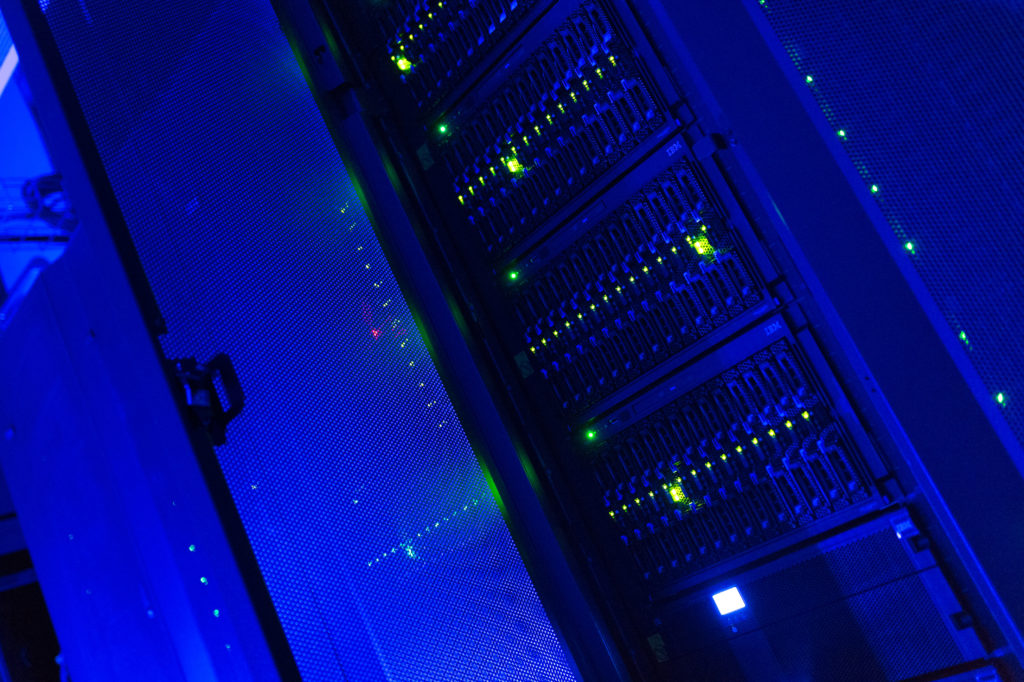
In a laboratory in the BC Children’s Hospital Research Institute, researchers work to identify the consequences of genetic variations. To do so, they rely on computational methods and tools, such as sophisticated software, databases and algorithms, which require a powerful infrastructure.
“The future of medicine lies in our ability to analyze vast amounts of patient data to pinpoint the causes of disease and the sources of treatment,” says Dr. Wyeth Wasserman, Associate Dean, Research in the Faculty of Medicine and Executive Director of the BC Children’s Hospital Research Institute. “But to do this, it’s essential that patient data is protected and researchers are able to work together.”
To address the immediate computing and storage needs of many UBC researchers, as well as issues surrounding health data access, the university is investing $7.9-million in digital research infrastructure. The project, a joint effort of the Office of the Vice-President Research and Innovation and the Office of the Chief Information Officer, was named ‘UBC ARC Sockeye.’
Through the initiative, the university is working towards strengthening shared infrastructure and resources to support research excellence, as described in Strategy 7: Research Support in UBC’s strategic plan.
“This investment will help support the diverse collaborations necessary to improve health care, while maintaining security and privacy to protect our data,” says Dr. Wasserman, who is part of the UBC Advanced Research Computing (ARC) Advisory Committee.
Researchers in disciplines spanning health, natural sciences, engineering and the humanities are increasingly reliant on advanced research computing infrastructure to deliver the computing power and complex storage required to analyze and share large volumes of data.
Steve Cundy, director of UBC’s ARC team that is overseeing the implementation of the new infrastructure, explains: “This is a crucial investment for UBC as the current national platform provider can’t meet the demands of all researchers.”
He notes that it will particularly benefit early-career researchers, those who are new to UBC, and any researcher specializing in computationally intensive research.
More computational power, more research capacity
UBC ARC Sockeye will provide a bridge for researchers to access national platforms. In addition, it will develop storage configurations that satisfy all national, provincial and local requirements around sensitive or confidential data.
The investment will enhance the computational and storage capacity available to research and the ability to analyze the stored data through an initial addition of a high performance platform featuring 7,376 CPU cores, approximately 1 petabyte (1,000 terabytes) of usable file storage and an object storage platform with about 13 petabytes of raw and 10 petabytes of useable capacity.
Dr. Sally Aitken, a genomics researcher and Associate Dean of Research and Innovation in the Faculty of Forestry, welcomed this investment for the UBC community.
“By enhancing access to the high-performance computing power and storage required by fields such as genomics, this investment will accelerate research, enhance training of highly qualified researchers, and support collaborations on large-scale projects,” she says. “I can also see it having positive impacts on faculty recruitment and retention across the university.”

For Dr. Joshua Brinkenhoff, also a member of the ARC Advisory Committee and an Assistant Professor in UBC Okanagan’s School of Engineering, UBC ARC Sockeye will benefit his research considerably. He investigates the flow instabilities of fluids and how that impacts performance and efficiency in aerospace, nuclear, and energy industries.
“The behaviour of turbulent fluids is one of the most challenging topics in physics and engineering, and has huge effects on our daily lives. The raw computational power provided by the new system is absolutely essential for my research area to ensure the safety of liquefied natural gas equipment, as well as other applications,” Dr. Brinkenhoff says. “The system is especially beneficial because it provides early-career researchers such as myself compute resources that we otherwise couldn’t access—speeding up the process of research and innovation.”
Another member of the ARC Advisory Committee is Dr. Muhammad Abdul-Mageed, Assistant Professor of Computational Linguistics, Information Science, and Computer Science, whose research is in deep learning and natural language processing.
“There has been a revolution in the use of AI in almost all areas of science and technologies, and now in the social sciences and humanities, in recent years. At the heart of these enormous advances is deep learning, a field of AI powered primarily by huge amounts of data and heavy compute infrastructure such as powerful graphical processing units (GPUs). The new investments will position UBC scholars, including early career researchers, to develop new methods, make exciting discoveries, and remain a leader in AI,” Dr. Abdul-Mageed says.
Resources will be available to all UBC researchers through a process that is under development, with the first competition to be launched in September on the ARC website. For more information about ARC and the capital investment in advanced research computing infrastructure please visit https://arc.ubc.ca.